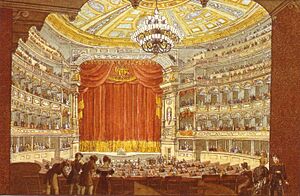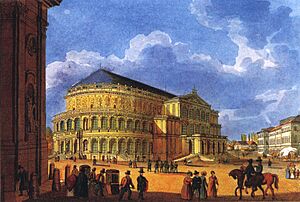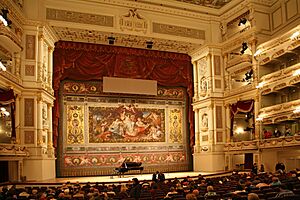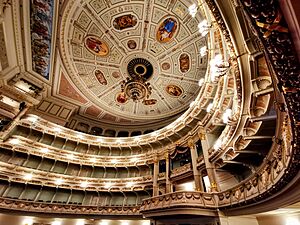Semperoper facts for kids
 |
|
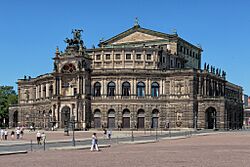
The Semperoper in 2013
|
|
| Location | Dresden, Germany |
|---|---|
| Coordinates | 51°03′16″N 13°44′07″E / 51.05444°N 13.73528°E |
| Type | Opera house, concert hall |
| Capacity | 1,300 |
| Construction | |
| Built | 1841 (original) 1878 (first reconstruction) 1985 (second reconstruction) |
| Architect | Gottfried Semper |
The Semperoper is a famous opera house in Dresden, Germany. It is home to the Saxon State Opera and the Saxon State Orchestra, called the Staatskapelle Dresden. It also hosts the Semperoper Ballet. The building stands in the historic center of Dresden, right by the Elbe River.
The original opera house was built by the architect Gottfried Semper in 1841. After a big fire in 1869, it was rebuilt. Semper helped with the new design, and it was finished in 1878. The Semperoper is famous for being the place where many important operas were first performed. These include works by famous composers like Richard Wagner and Richard Strauss.
Contents
History of the Semperoper
The first opera house on this spot was designed by Gottfried Semper. It opened on April 13, 1841, with an opera by Carl Maria von Weber. The building had a mix of styles, including parts that looked like early Renaissance and Baroque buildings. It also had Corinthian style pillars, which are common in Greek classical revival buildings. This mix of styles is called eclecticism. Many people thought Semper's first opera house was one of the most beautiful in Europe.
After a terrible fire in 1869, the people of Dresden wanted their opera house rebuilt right away. They asked Gottfried Semper to design the new one, even though he was living away from Dresden for political reasons. Semper's son, Manfred Semper, used his father's plans to build the second opera house. It was finished in 1878 and built in the Neo-Renaissance style.
The building is a great example of Baroque Revival architecture. It is located on Theatre Square in central Dresden, next to the Elbe River. On top of the entrance, there is a statue of a four-horse chariot (called a quadriga) with a statue of Dionysos, a Greek god. Inside, there are statues of famous artists like Johann Wolfgang von Goethe, Friedrich Schiller, William Shakespeare, and Molière. Before World War II, many operas by Richard Strauss had their first performances here.
In 1945, during the last months of World War II, the building was mostly destroyed again. This happened during the bombing of Dresden and the huge fire that followed. Only the outer walls were left standing.
Exactly 40 years later, on February 13, 1985, the opera house was completely rebuilt. It looked almost exactly like it did before the war. However, it now had new stage equipment and a modern building behind it for services. The Semperoper reopened with the same opera that was playing just before it was destroyed in 1945: Carl Maria von Weber's Der Freischütz.
In 2002, the Elbe River flooded and caused a lot of water damage to the building. But with a lot of help from people around the world, it reopened in December of that same year.
Who Manages the Semperoper Today?
Today, the main orchestra for most operas at the Semperoper is the Sächsische Staatskapelle Dresden. The person in charge of the Semperoper is called the Intendant. As of the 2024–2025 season, Nora Schmid is the Intendantin (female Intendant) of the company.
Famous Conductors
- Carl Gottlieb Reißiger
- Richard Wagner
- Ernst von Schuch (1889–1914)
- Fritz Reiner (1914–1921)
- Fritz Busch (1922–1933)
- Karl Böhm (1934–1942)
- Karl Elmendorff (1943–1944)
- Joseph Keilberth (1945–1951)
- Rudolf Kempe (1949–1952)
- Otmar Suitner (1960–1964)
- Kurt Sanderling (1964–1967)
- Herbert Blomstedt (1975–1985)
- Hans Vonk (1985–1990)
- Giuseppe Sinopoli (1992–2001)
- Semyon Bychkov (2001–2002)
- Bernard Haitink (2002–2004)
- Fabio Luisi (2007–2010)
- Christian Thielemann (2012–2024)
Famous Singers
- Bernd Aldenhoff
- Helena Forti
- Elisabeth Höngen
- Friedrich Plaschke
- Elisabeth Rethberg
- Karl Scheidemantel
- Ernestine Schumann-Heink
- Erna Sack
- Richard Tauber
- Tino Pattiera
- Annie Krull
- Riza Eibenschütz
- Irma Tervani
- Meta Seinemeyer
- Margarethe Siems
- Therese Malten
- Edda Moser
- Minnie Nast
- Eva von der Osten
- Karl Perron
- Hermann Wedekind
- Marie Wittich
Operas First Performed Here
Many operas had their very first performances, called premieres, at the Semperoper. Here are some of them:
- 1842: Richard Wagner – Rienzi, 20 October
- 1843: Richard Wagner – The Flying Dutchman, 2 January
- 1845: Richard Wagner – Tannhäuser, 19 October
- 1895: Eugen d'Albert: Ghismonda, 28 November
- 1901: Richard Strauss – Feuersnot, 22 November
- 1905: Richard Strauss – Salome, 9 December
- 1909: Richard Strauss – Elektra, 25 January
- 1911: Richard Strauss – Der Rosenkavalier, 26 January
- 1913: Ermanno Wolf-Ferrari – L'amore medico, 4 December
- 1916: Eugen d'Albert – Die toten Augen, 5 March
- 1917: Hans Pfitzner – Das Christ-Elflein (2nd version), 11 December
- 1924: Richard Strauss – Intermezzo, 4 November
- 1925: Ferruccio Busoni – Doktor Faust, 21 May
- 1926: Kurt Weill – Der Protagonist, 27 March
- 1926: Paul Hindemith – Cardillac, 9 November
- 1927: Emil von Reznicek – Spiel oder Ernst
- 1927: Othmar Schoeck – Penthesilea, 8 January
- 1928: Richard Strauss – Die ägyptische Helena, 6 June
- 1930: Othmar Schoeck – Vom Fischer and syner Fru, 3 October
- 1932: Eugen d'Albert – Mr Wu
- 1933: Richard Strauss – Arabella, 1 July
- 1935: Richard Strauss – Die schweigsame Frau, 24 June
- 1935: Rudolf Wagner-Régeny – Der Günstling, 20 February
- 1937: Othmar Schoeck – Massimilla Doni, 2 March
- 1938: Richard Strauss – Daphne, 15 October
- 1940: Heinrich Sutermeister – Romeo und Julia, 13 April
- 1942: Heinrich Sutermeister – Die Zauberinsel, 31 October
- 1944: Gottfried von Einem – Prinzessin Turandot, 5 February
- 1944: Joseph Haas – Die Hochzeit des Jobs, 2 July
- 1985: Siegfried Matthus – Die Weise von Liebe und Tod des Cornets Christoph Rilke, 16 February
- 1989: Eckehard Meyer – Der goldene Topf, 1989
- 1998: Matthias Pintscher – Thomas Chatterton, 25 May
- 2001: Peter Ruzicka – Celan, 25 March
- 2008: Manfred Trojahn – La grande magia, 10 May
- 2010: Hans Werner Henze – Gisela (Dresden version), 20 November
- 2011: Miroslav Srnka – Jakub Flügelbunt , 15 December
- 2012: Johannes Wulff-Woesten – Die Konferenz der Tiere, 8 July
- 2013: Johannes Wulff-Woesten – Prinz Bussel, 27 April
Images for kids
See also
- Opernhaus am Taschenberg
 | Emma Amos |
 | Edward Mitchell Bannister |
 | Larry D. Alexander |
 | Ernie Barnes |


